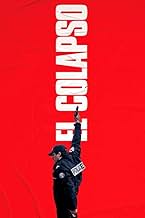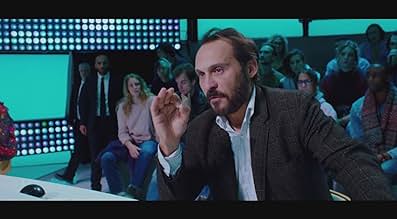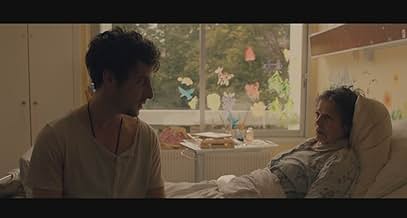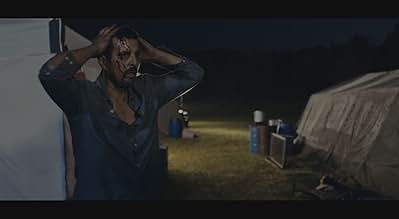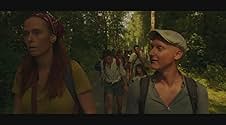IMDb-BEWERTUNG
7,8/10
2951
IHRE BEWERTUNG
Was würde mit unserer Gesellschaft passieren, wenn das System morgen zusammenbrechen würde?Was würde mit unserer Gesellschaft passieren, wenn das System morgen zusammenbrechen würde?Was würde mit unserer Gesellschaft passieren, wenn das System morgen zusammenbrechen würde?
- Auszeichnungen
- 2 Nominierungen insgesamt
Folgen durchsuchen
Empfohlene Bewertungen
This is a great miniseries, comprised of 15-20 min long episodes.
Each episode is shot in one take, and this is a great achievement by itself. They are by no means static episodes - they don't take place inside a room, with people sitting down and talking. These are fast, action-packed episodes, where we follow people in different situations after the collapse of our economy and society. Thus, the planning and shooting of the series deserves the greatest credit.
What we take for granted every day in our civilized societies, the flow of goods and services, the civility of people themselves, depend on a great deal of interdependence and abundance of resources. Our global economy acts with the notion that we should grow and expand infinitely, buy more, consume more, and exploit the resources, the people and the world in the process.
We think this can never change. Actually, we don't think about it at all. We continue our roles assigned to us in our everyday lives.
The truth is that it all hangs by a thin thread. It can all change very easily and quickly.
We saw the prequel in the first days of Covid-19, when the supermarkets were depleted of goods, and people were actually fighting over the last items of food or toilet paper.
We depend on the cogs of the machine working perfectly, to survive.
This series gives an enlightening glimpse of how events may unfold when the system stops functioning one day. Recommended.
Each episode is shot in one take, and this is a great achievement by itself. They are by no means static episodes - they don't take place inside a room, with people sitting down and talking. These are fast, action-packed episodes, where we follow people in different situations after the collapse of our economy and society. Thus, the planning and shooting of the series deserves the greatest credit.
What we take for granted every day in our civilized societies, the flow of goods and services, the civility of people themselves, depend on a great deal of interdependence and abundance of resources. Our global economy acts with the notion that we should grow and expand infinitely, buy more, consume more, and exploit the resources, the people and the world in the process.
We think this can never change. Actually, we don't think about it at all. We continue our roles assigned to us in our everyday lives.
The truth is that it all hangs by a thin thread. It can all change very easily and quickly.
We saw the prequel in the first days of Covid-19, when the supermarkets were depleted of goods, and people were actually fighting over the last items of food or toilet paper.
We depend on the cogs of the machine working perfectly, to survive.
This series gives an enlightening glimpse of how events may unfold when the system stops functioning one day. Recommended.
Five episodes, all shot in one take, five different situations in an escalation.
This was so tense it actually gave Chernobyl a match, with much much lesser means. Episode 1 is the weakest, because of the acting, but it already sets the mood : extreme paranoïa, and survival of the fittest!
That was quite an achivement in horror in its purest sense. Highly recomended!
Edit : Episodes 6-8 are on the same model, but add some interconnectivity between some storylines, to great effect.
If you liked those epic long one shot's scenes brought to you by the combo Alfonso Cuarón + Emmanuel Lubezky, you will love this series. You also can notice their influence on the authors of L'Effondrement, because the plot of the movie also brings a postapocalyptical theme.
Don´t look up is another recent comparison regarding the topics covered in one of the chapters of this series. Bringing some uncomfortable truth to the table and having to deal with people's indifference.
Technically astounding, i dont know yet how they filmed some parts of the scenes, but I understand that they put a lot of work into preparing them.
The acting is amazing. Every character is depicted in great detail, and you connect and empathize with each of them.
One of the best series of recent times, and they didn´t need eight seasons for achieving that. Just eight 20min chapters.
Don´t look up is another recent comparison regarding the topics covered in one of the chapters of this series. Bringing some uncomfortable truth to the table and having to deal with people's indifference.
Technically astounding, i dont know yet how they filmed some parts of the scenes, but I understand that they put a lot of work into preparing them.
The acting is amazing. Every character is depicted in great detail, and you connect and empathize with each of them.
One of the best series of recent times, and they didn´t need eight seasons for achieving that. Just eight 20min chapters.
The highlight of this mini series is its realization. Each chapter is shot with a handheld camera and in a single continuous take without editing, which makes it a novel product and very difficult to film. Another feature of the series is that the last episode could be considered the first, since the final chapter tells the origin of how the collapse of the world began. Each episode is independent of the other and tells stories of ordinary people in an environment in which the planet has collapsed and there is a lack of food, energy services are scarce or failing and people try by all means to find a way to survive, as they As the episodes go by, there is a progressive count of the days that have passed since this collapse, so as the stories progress they are increasingly crude and violent. We can see how people are desperate to get food that is missing in a market, fuel to escape to a safer place or simply people with a lot of money who have hired special services that will take them to special bunkers so that they are safe. A very entertaining, innovative series, very well directed and acted, and with a message that will leave more than one viewer thinking about the real possibility that the day of the collapse can come true.
Abstract
Eight exciting chapters, eight moments and extreme situations derived from a sudden? crisis that leaves the planet without supplies.
Review
Starting on J-Day, there is a sudden global collapse whereby the supply of food, energy and other inputs is cut off.
This French miniseries addresses in each chapter distressing situations that arise from that event whose nature we ignore.
But it does not do it in any way: each one of its nervous chapters lasts only around 20 minutes and is filmed in real time with a handheld camera and in a single sequence shot. And it is not a quirk of style: the dramatic effect is prodigious and the technical expertise in the realization in some is astonishing.
The series does not fall into the usual Manichean nihilism of apocalyptic dystopias because, although human miseries appear in each chapter, the result of desperation for survival, gestures of solidarity and collaboration are not absent either.
The situations dealt with are individual or collective, often dilemmatic, with very different locations, different characters (with very few exceptions and few links between them) and with strong social and class notes, but without falling into the cliché. Overall the pacing is distressing but never hysterical, and the filmmakers have a knack for making chapters quite different and with room for surprise.
Filmed in 2019, this dystopia directed by Jérémy Bernard, Guillaume Desjardins and Bastien Ughetto (who stars in one of the most terrifying episodes) is prescient in some aspects of the global coronavirus crisis and undoubtedly related to the prevailing capitalist modes of production.
Pay attention to the final titles of each chapter. If you pay attention, you will see that they are revealing.
Eight exciting chapters, eight moments and extreme situations derived from a sudden? crisis that leaves the planet without supplies.
Review
Starting on J-Day, there is a sudden global collapse whereby the supply of food, energy and other inputs is cut off.
This French miniseries addresses in each chapter distressing situations that arise from that event whose nature we ignore.
But it does not do it in any way: each one of its nervous chapters lasts only around 20 minutes and is filmed in real time with a handheld camera and in a single sequence shot. And it is not a quirk of style: the dramatic effect is prodigious and the technical expertise in the realization in some is astonishing.
The series does not fall into the usual Manichean nihilism of apocalyptic dystopias because, although human miseries appear in each chapter, the result of desperation for survival, gestures of solidarity and collaboration are not absent either.
The situations dealt with are individual or collective, often dilemmatic, with very different locations, different characters (with very few exceptions and few links between them) and with strong social and class notes, but without falling into the cliché. Overall the pacing is distressing but never hysterical, and the filmmakers have a knack for making chapters quite different and with room for surprise.
Filmed in 2019, this dystopia directed by Jérémy Bernard, Guillaume Desjardins and Bastien Ughetto (who stars in one of the most terrifying episodes) is prescient in some aspects of the global coronavirus crisis and undoubtedly related to the prevailing capitalist modes of production.
Pay attention to the final titles of each chapter. If you pay attention, you will see that they are revealing.
Top-Auswahl
Melde dich zum Bewerten an und greife auf die Watchlist für personalisierte Empfehlungen zu.
- How many seasons does The Collapse have?Powered by Alexa
Details
- Erscheinungsdatum
- Herkunftsland
- Offizieller Standort
- Sprache
- Auch bekannt als
- L'Effondrement
- Weitere beteiligte Unternehmen bei IMDbPro anzeigen
Zu dieser Seite beitragen
Bearbeitung vorschlagen oder fehlenden Inhalt hinzufügen


![Bande-annonce [OV] ansehen](https://m.media-amazon.com/images/M/MV5BNWY2M2EzYTYtYWVlZS00OTc0LTg4MTQtMGJjZmQzMzA1N2I3XkEyXkFqcGdeQXRyYW5zY29kZS13b3JrZmxvdw@@._V1_QL75_UY281_CR81)
